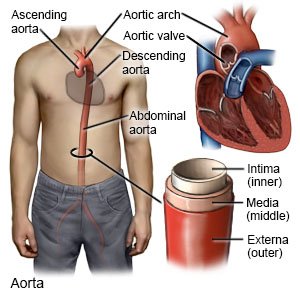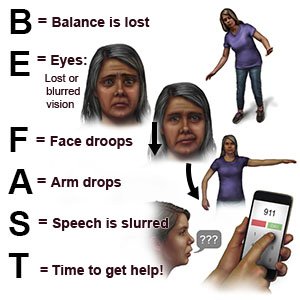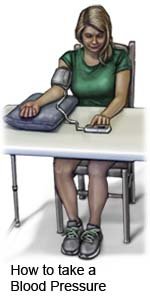Nonruptured Abdominal Aortic Aneurysm
Medically reviewed by Drugs.com. Last updated on Aug 4, 2025.
An AAA is a bulging or weak area in your abdominal aorta. Over time, the bulge may grow and is at risk for tearing or rupturing (bursting). The aorta is a large blood vessel that extends from your heart to your abdomen. The part of the aorta that extends into your abdomen is called your abdominal aorta. Your abdominal aorta brings blood to your stomach, pelvis, and legs. Treatment may be needed so your aneurysm does not grow and rupture. An AAA rupture is a life-threatening emergency.
 |
DISCHARGE INSTRUCTIONS:
Call your local emergency number (911 in the US), or have someone else call if:
- You have any of the following signs of a stroke:
- Numbness or drooping on one side of your face
- Weakness in an arm or leg
- Confusion or difficulty speaking
- Dizziness, a severe headache, or vision loss
-

- You faint or lose consciousness.
- You cannot be woken.
Seek care immediately if:
- You have sudden sharp pain in your abdomen, groin, back, legs, or buttocks.
- You have nausea and are vomiting.
- You feel dizzy.
- You have stiffness or swelling in your abdomen, or a lump in your abdomen.
- You have numbness or tingling in your legs.
- Your skin is pale, sweaty, or clammy.
Related medications
Call your doctor if:
- You have questions or concerns about your condition or care.
Medicines:
You may need any of the following:
- Blood pressure (BP) medicine may be given to lower your BP.
- Cholesterol medicine may be given to lower your cholesterol level.
- Take your medicine as directed. Contact your healthcare provider if you think your medicine is not helping or if you have side effects. Tell your provider if you are allergic to any medicine. Keep a list of the medicines, vitamins, and herbs you take. Include the amounts, and when and why you take them. Bring the list or the pill bottles to follow-up visits. Carry your medicine list with you in case of an emergency.
Treatment options
The following list of medications are related to or used in the treatment of this condition.
Manage a nonruptured AAA:
- Do not use nicotine products or stimulating drugs. Nicotine and drugs such as cocaine may raise your BP, damage your aorta, or make your AAA larger. Ask your provider for information if you currently smoke or use stimulating drugs and need help to quit. E-cigarettes or smokeless tobacco still contain nicotine. Do not use these in place of cigarettes. Avoid secondhand smoke.
- Manage other health conditions that can cause or worsen an AAA. Follow your treatment plan to manage conditions such as high cholesterol, obesity, or stress. Check your BP as directed if you have high BP. Your provider will show you how to do this. Check your BP 2 times, 1 minute apart. Check as often as directed each day. Keep a record of your readings and bring it to your follow-up visits.

- Follow physical activity directions. Your healthcare provider may help you create a physical activity plan. Your plan may include low-intensity activity, such as walking, yoga, or swimming. Do not lift anything heavier than 10 pounds. You may also need to avoid intense physical activity, such as running. Heavy lifting or intense activity may raise your BP or put pressure on your aorta. These increase your risk for a tear or rupture.

- Follow the meal plan recommended by your provider. Talk to your provider or dietitian about a heart-healthy or low-sodium meal plan. A meal plan may help you lower your cholesterol or BP levels. Heart-healthy meal plans are low in sodium, processed sugar, and some fats. They are high in potassium, calcium, heart-healthy fats, and fiber. These can be found in vegetables, fruit, and whole-grain foods.

- Know the risks if you choose to drink alcohol. Alcohol can increase your BP. Ask your provider if it is okay for you to drink any alcohol. Your provider can help you set limits for the number of drinks you have in 24 hours and within 1 week. A drink of alcohol is 12 ounces of beer, 5 ounces of wine, or 1½ ounces of liquor.
- Get vaccines as directed. Some viruses can worsen an AAA. Get an influenza (flu) vaccine as soon as recommended each year, usually in September or October. Get all recommended COVID-19 vaccine doses and boosters. A pneumonia vaccine may also be recommended. Your provider will tell you if you need other vaccines, and when to get them.
Follow up with your doctor as directed:
You will need regular tests to monitor the size of your AAA. Your doctor will tell you how often to have the tests. Keep all appointments. Write down your questions so you remember to ask them during your visits.
© Copyright Merative 2025 Information is for End User's use only and may not be sold, redistributed or otherwise used for commercial purposes.
The above information is an educational aid only. It is not intended as medical advice for individual conditions or treatments. Talk to your doctor, nurse or pharmacist before following any medical regimen to see if it is safe and effective for you.
Learn more about Nonruptured Abdominal Aortic Aneurysm
Treatment options
Care guides
Further information
Always consult your healthcare provider to ensure the information displayed on this page applies to your personal circumstances.
